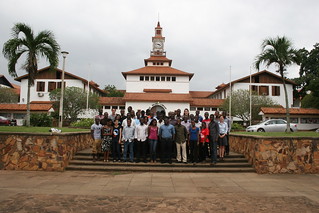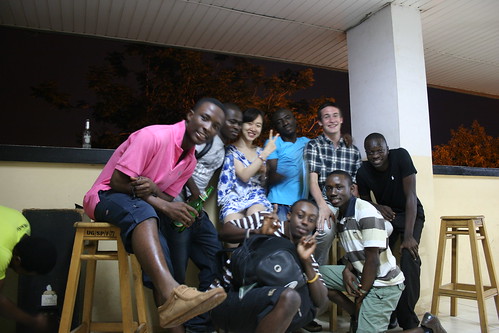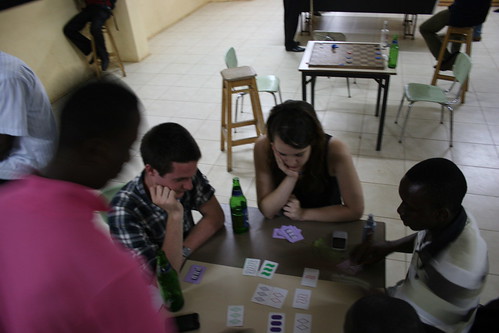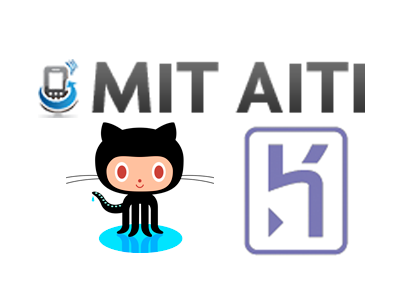Kumasi and the Ashanti Region
Louis, LiAn, and I ventured to Kumasi while Jovana had a round of I Can't Believe It's Not Malaria™! last Friday night. We took a VIP bus up on Friday night, this Korean-made "gargantuan" (as they say here) red vehicle with disco lights and a soundtrack of Michael Jackson and Donna Summer to match the interior illumination. The route to Kumasi starts out with smooth pavement, like any other road in this country, but very quickly turns into maybe 50 kilometers of bumps and potholes. Calling this a "road" is an affront to paved surfaces everywhere.
Rules of the road are also thrown out on this gravely patch. Cars and trucks spread out, each rumbling along and picking the best and flattest way through the metaphorical minefield of holes. Southbound traffic threads their way through the fanned out northbound vehicles. It feels like a post-apocalyptic road rally. It would not have been out of place to see the trucks from Transformers weaving in and out of potholes around us. I can't imagine what this is like during the rainy season, with the road turned to mush.
Eventually the rough patch gives way to a proper road, and we swayed through the night to Kumasi, alighting at the junction near KNUST (West Africa's premiere science and technology university), and finding our hostel around 3 am.
After a couple hours of sleep, we presented to members of mFriday at KNUST about our program, getting some excitement from both the students and board members for MIT AITI Ghana. Whether our program alumni join mFriday as peer mentors, or mFriday winds up helping us recruit, I think they'll be a valuable organization for helping our participants sustain their interest in their projects, as well as build a developer community across universities and cities in Ghana.
Godfried and Godwin (and earlier we met with Godsway) picked us up and took us to the main market in town. It's the largest open-air market in West Africa, if not the entire continent. Following Godfried, we ducked into the maze of shack shops, selling used clothing, food, chickens, jewelry, peanut brittle, toiletries, cleaning supplies, injection-molded plastic products, and just about any other basic supply. Including chickens.


We met up with Pierre, one of the founders of mFriday, and a complete firecracker. We had a lively discussion about people skills, MBAs, smoothie making, teaching innovation, building infrastructure and capacity in Ghana, and how to get your yard boy to negotiate with the trash collectors.
Lake Bosumtwe
As the sun set, we pulled out of Pierre's home and acquired Anna, a friend from MIT in Ghana on a Fulbright fellowship. We drove up a hill and down a wiggly road to Lake Bosumtwe, an almost perfectly round lake formed from a meteorite impact in the verdant hills. Godfried wouldn't tell you this, but his father was on the research team that proved the lake was not volcanic, but impact in origin.
The generous manager at the Bayview Resort found us rooms and we awoke the next morning a few meters from this splendid lake with rays of sun streaming through the clouds. Anna, LiAn, and I sauntered down to the lakeside and ordered breakfast, fresh grilled tilapia fish and coconuts.
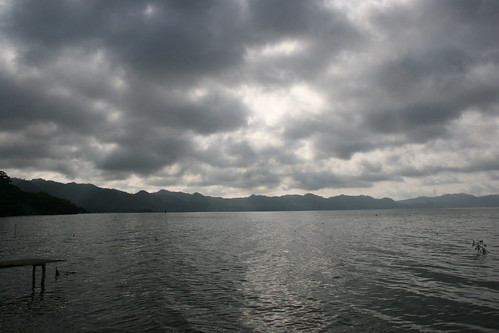

As the lake is sacred, there's a restriction on fishing from actual boats on the lake. Fishermen here use these planks that look like unhollowed canoes. One cast his net as we watched the sun rise over the lake, light streaming over the thickly forested mountains.

It took forever for the food to arrive. Bored and hungry, we dug into a soursap fruit, this rich creamy thing that looked like a spiky avocado on the outside and thick white cotton with large seeds on the inside. The fisherman came into shore, his 'boat' laden with a dozen or so fish. Anna and I looked out at the water, the chickens, and talked about developing capacity in Ghana. Throwing a house party in Stinson Beach when we get back. Next up: a cocoa pod, filled with the precursor to chocolate: beans. Each bean had a delightfully sweet, fleshy coating that you could suck on. The beans themselves were highly bitter and ranged in color from bright purple to murky brown.

A teenaged boy scaled a nearby coconut palm and brought down a coconut. Then a few more. He proceeded to go at them with a machete, carving them down to just the nut, removing the husk.

After about an hour and a half of waiting, I went in to inquire about the state of our breakfast, and the caretaker at the hotel assured us that it'd be out soon. I could smell the fish cooking, so I decided it'd probably be better to wait than find another source of sustenance. Finally, Nana brought out the fish and the coconuts.
"That took a long time! Did you have to go out and catch the fish?"
"Actually... yes."
We all laughed. Coconut meat was perfect. Fish was flawless. Best food in Ghana so far, hands down, not hurt by the fact that it was served with a fresh ginger/pepper sauce and that IT WAS CAUGHT IN A CRATER LAKE FORMED BY A METEOR IMPACT. Why yes, I have a master's in planetary science, so slow customer service is okay so long as the food was caught inside a meteor impactor crater.

